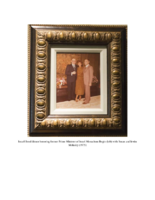Search the Special Collections and Archives Portal
Search Results

Transcript of interview with Lucille Down by James Hanson, February 21, 1972
Date
Archival Collection
Description
On February 21, 1972, James Hanson interviewed Mrs. Lucille Down (born December 14th, 1911 in Wellington, Kansas) in her home in Las Vegas, Nevada. The interview covers the lives of Union Pacific Railroad workers, and local education at schools such as the Las Vegas Grammar School and Las Vegas High School. Lucille discusses her first job, which was at the Southern Nevada Telephone Company. She also mentions having a swamp cooler attached to her family home. She concludes this interview with recollections on the social, recreational, religious and economic, changes that contributed to the development and growth of Las Vegas, Nevada.
Text

Transcript of interview with Gilbert D. Yarchever by Claytee White, 2006
Date
Archival Collection
Description
Gilbert Yarchever was one of nine siblings, born and bred in Pittsburgh, Pennsylvania. He describes the way his mother?s family was granted the last name of ?Kurfeersf" by Emperor Franz Joseph (of Austria-Hungary), explains the Seder (the Jewish observation of the exodus of Hebrews from Egypt), and tells what it was like to survive the Depression. Gilbert describes the jobs he held after high school and the government examination he took that led to his lifetime of adventure and travel. He moved to Washington, D.C., in 1940 and kept himself busy working for the government and taking classes at George Washington University, as well as working part time at Hecht Department Store and as a freelance court reporter. Following the attack on Pearl Harbor in 1941, Gilbert was sent to Africa on a merchant ship, helped smuggle Jewish survivors into Jerusalem, and was assigned the task of negotiating with Arab sheikhs for laborers to build a road. In the years after that, he worked in Europe, Panama, Alaska, Japan, and Hawaii and describes many of the jobs he was responsible for and many of the individuals he met. He also married and had children, kept up with university classes whenever he could, and collected art objects and paintings. Following his retirement in 1977, Gilbert and his family came to Las Vegas and bought a condo in Regency Towers. He did some consulting work for a couple of years, and then he and his wife began traveling around the states and going abroad. He was involved with UNLV?s EXCEL program, the music department, and the Las Vegas Art Museum. (He and his second wife Edythe presented the first major exhibition on Holocaust art at the museum.) These days Gilbert often donates pieces from his art collection to churches, synagogues, and charitable organizations.
Gilbert Yarchever was in the Navy during World War II, helped smuggle Jewish refugees into Jerusalem, worked as a civil servant in many countries, and moved to Las Vegas in 1977. He helped found the EXCEL program at University of Nevada, Las Vegas and was an art collector with his wife, Edythe Katz-Yarchever.
Text
Elaine Newton oral history interview
Identifier
Abstract
Oral history interview with Elaine Newton conducted by Cecilia Winchell, Kristel Peralta, and Vanessa Concepcion on May 19, 2021 for Reflections: The Las Vegas Asian American and Pacific Islander Oral History Project.
Elaine Newton shares her family's history living in Hawaii and Japan, and memories from her childhood growing up with her six siblings in Honolulu. She talks about becoming a flight attendant for Pan American World Airways and how she met her former husband, Wayne Newton, after a stop in Vietnam. Elaine recalls their courtship and marriage as well as what Las Vegas life, fashion, and entertainment were like during the 1980s. She also speaks about racial discrimination and anti-asian violence in the past and present.
Archival Collection

Mike Montano interview, September 19, 2008: transcript
Date
Archival Collection
Description
First played in Las Vegas with Jack E. Leonard in 1960. Only worked at two hotels during his 24-year Las Vegas career - Flamingo and riviera
Text

Dr. Ruben J. Acherman interview, July 18, 2019: transcript
Date
Archival Collection
Description
Interviewed by Monsserath Hernandez, Laurents Bañuelos-Benitez, and Claytee White. Dr. Acherman has been practicing in Southern Nevada for nearly 20 years and continues to care for the community at the Children's Heart Center of Nevada in Las Vegas. Born and raised in the small town of Palmira, Colombia with his two sisters and parents. His father is from Romania and immigrated to Ecuador while escaping from Nazi occupied Europe during World War II. Dr. Acherman eventually moved to Cali, Colombia in order to attend medical school. knowing that he wanted to specialize in cardiology and being unable to do cardiology in Colombia he immigrated to the U.S. and specialized in pediatrics at USC. After practicing for two years in Toronto, he was contacted by Dr. Evans in 2001 with an offer to work at his practice in Southern Nevada where he was able to successfully perform the first balloon dilation in the state of Nevada.
Text

Transcript of interview with Ray Christian by Russell L. Ellis, March 19, 1978
Date
Archival Collection
Description
On March 19, 1978, Russell L. Ellis interviewed former postal worker, Ray Christian (born 1927 in Las Vegas, Nevada). The two discuss Ray’s family history and his experiences as a Black man in early Las Vegas. Ray Christian compares the experiences of his childhood with that of his children in Las Vegas. The interview concludes with Christian expressing how Las Vegas has grown and that there are more opportunities available for his children to pursue.
Text

Interview with Anna (Anne) Welsh, June 23, 2004
Date
Archival Collection
Description
Text

Transcript of interview with Ruth Annette Mills by Lisa Gioia-Acres, November 20, 2008
Date
Archival Collection
Description
Ruth Annette Mills was born and raised in Washington, D.C. She recalls the early years during WWII, her father's cancer and radium treatment under Blue Cross Blue Shield, his passing when she was nineteen, and her marriage that same year. Ruth and her husband and family lived in Georgia, Texas, and Maryland before coming to Las Vegas in 1968. She worked as a typist for the Office of Education at one point and did volunteer work for her church, the Cub Scouts, and the League of Women Voters. She also worked as a clerk-typist for the Clark County School District, and eventually became a teacher through the Teacher Corps program. She graduated in 1975 and was hired to teach 6th grade at CVT Gilbert. The school integration program was just beginning when Ruth was first hired as a teacher. She held the position of facilitator and recalls how angry parents were when they learned their children had to be bussed to sixth grade centers. Having been involved through her church with the Civil Rights Movement in other states, she was disappointed with the racist attitudes she encountered in Las Vegas. Ruth's involvement with health care began when her daughter-in-law developed kidney stones and was denied treatment. In 1993 she started the Nevada Health Care Reform Project through the League of Women Voters in order to support Bill Clinton's health plan. Fifteen years later, over 100 organizations had come on board to support the League's coalition in favor of Clinton's plan, and her fondest wish is that one day Universal Health Care will be available to all Americans.
Text

Transcript of interview with Joanne Pattiani Molen by Irene Rostine, January 25, 1997
Date
Archival Collection
Description
Interviewed by Irene Rostine. In July of 1955, Joanne Molen's husband was offered a job at Nellis Air Force Base, so they moved from Alturas, California, to Las Vegas. Joanne had worked for Citizens Utilities in Alturas as a Western Union teletype operator, so she got a job with the Southern Nevada Telephone Company. She was the only woman to hold some of the positions she held. She worked for the telephone company, which became Sprint, for more than forty years, ending up as a main engineer. Joanne also was a volunteer and was active in community organizations including the American Ex-Prisoners of War and the Disabled American Veterans organizations, which lead to her being appointed by Governor Richard Bryan to the state of Nevada's Veterans Advisory Commission where she became the first woman to hold the position of chairman for the Commission. She was also voted Women of the Year four times by the local chapter of the American Business Women's Association for her work with veterans.
Text

